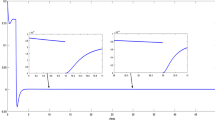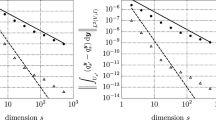Abstract
A discrete-time hybrid control model with Borel state and action spaces is introduced. In this type of models, the dynamic of the system is composed by two sub-dynamics affecting the evolution of the state; one is of a standard-type that runs almost every time and another is of a special-type that is active under special circumstances. The controller is able to use two different type of actions, each of them is applied to each of the two sub-dynamics, and the activations of these sub-dynamics are possible according to an activation rule that can be handled by the controller. The aim for the controller is to find a control policy, containing a mix of actions (of either standard- or special-type), with the purpose of minimizing an infinite-horizon discounted cost criterion whose discount factor is dependent on the state-action history and may be equal to one at some stages. Two different sets of conditions are proposed to guarantee (i) the finiteness of the cost criterion, (ii) the characterization of the optimal value function and (iii) the existence of optimal control policies; to do so, we employ the dynamic programming approach. A useful characterization that signalizes the accurate times between changes of sub-dynamics in terms of the so-named contact set is also provided. Finally, we introduce two examples that illustrate our results and also show that control models such as discrete-time impulse control models and discrete-time switching control models become special cases of our present hybrid model.
Similar content being viewed by others
Notes
a.k.a. continuous or regular.
a.k.a. discrete or impulsive.
So-called usual or traditional sub-dynamic.
So-called impulse-type or event-driven sub-dynamic.
Or conventional control model.
References
Abate, A., Amin, S., Prandini, M., Lygeros, J., Sastry, S.: Reachability analysis for controlled discrete-time stochastic hybrid systems. In: Hespanha, J., Tiwari A. (eds.) Lecture Notes in Computer Science, vol. 3927, pp. 49–63. Springer, Berlin (2006)
Abate, A., Prandini, M., Lygeros, J., Sastry, S.: Probabilistic reachability and safety for controlled discrete time stochastic hybrid systems. Automatica 44, 2724–2734 (2008)
Aliprantis, C.D., Border, K.C.: Infinite Dimensional Analysis. Springer, New York (2006)
Bensoussan, A., Lions, J.L.: Applications of Variational Inequalities in Stochastic Control. North-Holland, Amsterdam (1982) (pages are referred to the French edition)
Bensoussan, A., Lions, J.L.: Impulse Control and Quasi-Variational Inequalities. Gauthier-Villars, Paris (1984) (pages are referred to the French edition)
Bensoussan, A.: Dynamic Programming and Inventory Control. IOS Press, Amsterdam (2011)
Bensoussan, A., Menaldi, J.L.: Hybrid control and dynamic programming. Dyn. Contin. Discret. Impuls. Syst. 3, 395–442 (1997)
Bensoussan, A., Menaldi, J.L.: Stochastic hybrid control. J. Math. Anal. Appl. 249, 261–288 (2000)
Bertsekas, D.P., Shreve, S.E.: Stochastic Optimal Control: The Discrete-Time Case. Athena Scientific, Belmont, MA (1996)
Borkar, V.S., Ghosh, M.K., Sahay, P.: Optimal control of a stochastic hybrid system with discounted cost. J. Optim. Theory Appl. 101, 557–580 (1999)
Branicky, M.S.: Studies in hybrid systems: Modeling, analysis, and control, Thesis MIT, LIDS-TH-2304 (1995), Cambridge, USA
Branicky, M.S., Borkar, V.S., Mitter, S.K.: A unified framework of hybrid control: model and optimal control theory. IEEE Trans. Autom. Control 43, 31–45 (1998)
Goebel, R., Sanfelice, R.G., Teel, A.R.: Hybrid Dynamical Systems: Modeling, Stability, and Robustness. Princeton University Press, Princeton, NJ (2012)
Hernández-Lerma, O., Lasserre, J.B.: Discrete-Time Markov Control Processes: Basic Optimality Criteria. Springer, New York (1996)
Hernández-Lerma, O., Lasserre, J.B.: Further Topics on Discrete-Time Markov Control Processes. Springer, New York (1999)
Jasso-Fuentes, H., Menaldi, J.L., Prieto-Rumeau, T., Robin, M.: Discrete-time hybrid control in Borel spaces: average cost optimality criterion. J. Math. Anal. Appl. 462, 1695–1713 (2018)
Kallenberg, O.: Foundations of Modern Probability, 2nd edn. Springer, New York (2002)
Lygeros, J.: An overview of hybrid systems control. In: A. Hristu-Varsakelis, D., Levine W.S. (eds.) Handbook of Networked and Embedded Control Systems, vol. IV, pp. 519–537. Birkhäuser, Boston (2005)
Menaldi, J.L.: Optimal impulse control problems for degenerate diffusions with jumps. Acta Appl. Math. 8, 165–198 (1987)
Menaldi, J.L., Blankenship, G.L.: Optimal stochastic scheduling of power generation systems with scheduling delays and large cost differentials. SIAM J. Control Optim. 22, 121–132 (1984)
Puterman, M.L.: Markov Decision Processes: Discrete Stochastic Dynamic Programming. Wiley, New York (1994)
Quadrat, J.P.: Existence de solution et algorithme de resolutions numériques de problémes stochastiques degenerées ou non. SIAM J. Control Optim. 18, 199–226 (1980)
Rieder, U.: Measurable selection theorems for optimization problems. Manuscr. Math. 24, 115–131 (1978)
Robin, M.: Controle impulsionnel des processus de Markov. Thesis INRIA, TE-035, Paris, France (1977)
Robin, M.: Contrle impulsionnel avec retard pour les processus de diffusion. CRAS 282, 463–466 (1976)
Stettner, L.: Discrete time adaptive impulsive control theory. Stoch. Process. Appl. 23, 177–197 (1986)
Stettner, L.: On some stopping and impulsive control problems with a general discount rate criterion. Probab. Math. Stat. 10, 223–245 (1989)
Summers, S., Lygeros, J.: Verification of discrete time stochastic hybrid systems: a stochastic reach-avoid decision problem. Automatica 46, 1951–1961 (2010)
Yin, G.G., Zhang, Q.: Discrete-Time Markov Chains. Two-Time-Scale Methods and Applications. Springer, New York (2005)
Yin, G.G., Zhu, C.: Hybrid Switching Diffusions. Springer, New York (2010)
Zhang, W., Jianghai, H., Abate, A.: Infinite-horizon switched LQR problems in discrete time: a suboptimal algorithm with performance analysis. IEEE Trans. Autom. Control 57, 1815–1821 (2012)
Author information
Authors and Affiliations
Corresponding author
Additional information
This research was funded in part by CONACyT fellowship 266252 “Estancias sabáticas en el extranjero 2015”, by CONACyT Grant 238045, and by Grant MTM2016-75497-P from the Spanish Ministerio de Economía y Competitividad.
Rights and permissions
About this article
Cite this article
Jasso-Fuentes, H., Menaldi, JL. & Prieto-Rumeau, T. Discrete-Time Hybrid Control in Borel Spaces. Appl Math Optim 81, 409–441 (2020). https://doi.org/10.1007/s00245-018-9503-z
Published:
Issue Date:
DOI: https://doi.org/10.1007/s00245-018-9503-z




